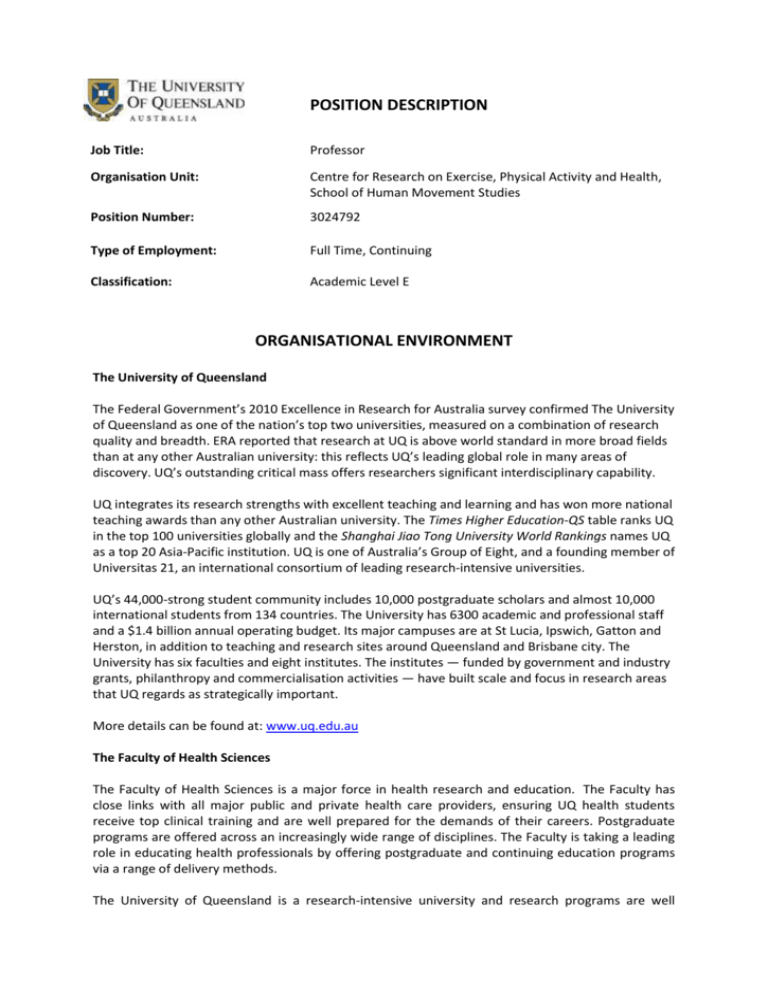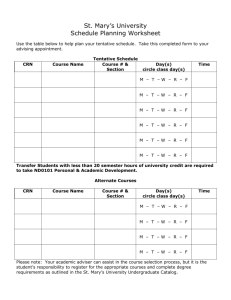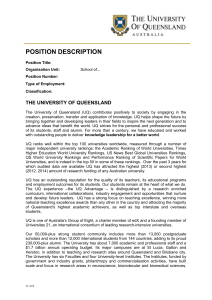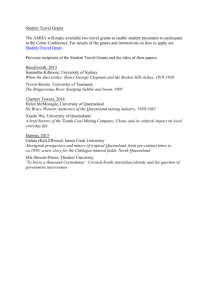3024792 Professor Continuing 493090
advertisement

POSITION DESCRIPTION Job Title: Professor Organisation Unit: Centre for Research on Exercise, Physical Activity and Health, School of Human Movement Studies Position Number: 3024792 Type of Employment: Full Time, Continuing Classification: Academic Level E ORGANISATIONAL ENVIRONMENT The University of Queensland The Federal Government’s 2010 Excellence in Research for Australia survey confirmed The University of Queensland as one of the nation’s top two universities, measured on a combination of research quality and breadth. ERA reported that research at UQ is above world standard in more broad fields than at any other Australian university: this reflects UQ’s leading global role in many areas of discovery. UQ’s outstanding critical mass offers researchers significant interdisciplinary capability. UQ integrates its research strengths with excellent teaching and learning and has won more national teaching awards than any other Australian university. The Times Higher Education-QS table ranks UQ in the top 100 universities globally and the Shanghai Jiao Tong University World Rankings names UQ as a top 20 Asia-Pacific institution. UQ is one of Australia’s Group of Eight, and a founding member of Universitas 21, an international consortium of leading research-intensive universities. UQ’s 44,000-strong student community includes 10,000 postgraduate scholars and almost 10,000 international students from 134 countries. The University has 6300 academic and professional staff and a $1.4 billion annual operating budget. Its major campuses are at St Lucia, Ipswich, Gatton and Herston, in addition to teaching and research sites around Queensland and Brisbane city. The University has six faculties and eight institutes. The institutes — funded by government and industry grants, philanthropy and commercialisation activities — have built scale and focus in research areas that UQ regards as strategically important. More details can be found at: www.uq.edu.au The Faculty of Health Sciences The Faculty of Health Sciences is a major force in health research and education. The Faculty has close links with all major public and private health care providers, ensuring UQ health students receive top clinical training and are well prepared for the demands of their careers. Postgraduate programs are offered across an increasingly wide range of disciplines. The Faculty is taking a leading role in educating health professionals by offering postgraduate and continuing education programs via a range of delivery methods. The University of Queensland is a research-intensive university and research programs are well developed in each of the Faculty’s seven schools: Dentistry, Health and Rehabilitation Sciences, Human Movement Studies, Medicine, Nursing and Midwifery, Pharmacy and Population Health as well as its many research centres. Further details are available on the Faculty’s web site at http://www.uq.edu.au/health/ School Profile – Human Movement Studies The School of Human Movement Studies has as its vision to extend, apply and transmit knowledge and understanding about human movement for the benefit of society at a standard that is recognised for its excellence both nationally and internationally. The School holds a leadership position in its field in the Australian tertiary environment and is highly regarded for its teaching, research and community outreach programs. The School is highly regarded for its teaching, research and community outreach programs. The current staff profile shows 30 FTE academic staff, 18 FTE research staff and 14.1 general staff. There are approximately 70 enrolled research higher degree students, and the total EFTSL of all enrolled students at undergraduate and postgraduate levels is approximately 625. The School offers three undergraduate degrees: the Bachelor of Exercise and Sport Sciences, Bachelor of Health, Sport and Physical Education and a Bachelor of Exercise and Nutrition Sciences and, and a dual degree with the Bachelor of Exercise and Nutrition Sciences and Master of Dietetics. The School also contributes into the dual Bachelor of Exercise and Sport Sciences / Bachelor of Business Management and Bachelor of Arts (Sports Studies), and a joint honours program in Sports and Exercise Psychology through the Bachelor of Arts. The School also offers a wide suite of postgraduate coursework programs in the areas of Clinical Exercise Physiology, Dietetics, Sports Coaching, Strength and Conditioning, Sports Medicine, Sport and Exercise Psychology and Human Movement Science. In 2013, the School will be offering a new program, the Masters in Sport Science. Further details about the School’s teaching programs, the research interests of academic staff, and other information about the School may be accessed on the School’s web site at http://www.hms.uq.edu.au The School currently has six established research areas: Physical activity and health Motor control, biomechanics (including ergonomics and functional anatomy) Pedagogy and socio-cultural studies Exercise and sport science Sport and exercise psychology Nutrition and dietetics In 2012 several of these research areas will be reconfigured into three research centres: The Centre for Research on Exercise, Physical Activity and Health, The Centre for Sensorimotor Neuroscience and the Centre of Sport, Physical and Health Education. The School encourages staff to work across research groups, to facilitate cross-fertilisation of theories and methods, and to form close affiliations with colleagues and projects across the University. The School of Human Movement Studies operates through a committee structure with delegated responsibilities and regular meeting times. The School Executive Committee has as its function to provide advice to the Head of School on matters related to strategic planning and resource allocation (including overall budgeting, resource allocation for equipment & facilities, and workload profiling & duties allocations). Membership consists of the Head of School, full-time professorial staff, School Manager, Technical Manager and the directors of the major School committees: Teaching & Learning Committee and Research Committee as well as the Postgraduate Student Coordinator. Other committees that meet less frequently include the Information Technology Committee, the Workplace Health and Safety Committee and the Equity Committee. Centre for Research on Exercise, Physical Activity and Health (CRExPAH) The Centre for Research on Exercise, Physical Activity and Health (CRExPAH) is a newly formed research centre within School of Human Movement Studies. The Centre seeks to foster research collaborations between exercise scientists and behavioural scientists to advance understanding of the measurement, uptake and health benefits of physical activity and, through this, provide a foundation for the development of evidence-based policies to improve Australia’s health. While it is located in the School of Human Movement Studies it has key links with other schools, research centres and Institutes within the Faculty of Health Sciences. Health CRN (Collaborative Research Network) The Collaborative Research Network (CRN) program is a Commonwealth funded initiative designed to encourage smaller less research-intensive and regional higher education institutions to develop their research capacity and adapt to a research system driven more strongly by performance outcomes by teaming up with other institutions in areas of common interest. The intention is that all participants in a collaborative network will benefit from the partnership, with flow-on effects for the research and innovation system as a whole. The Health CRN based at Central Queensland University (CQU) has $5.53 million in Commonwealth funding to develop partnerships in health research between CQU and the University of Queensland, Queensland University of Technology and Curtin University. The principal field of research in which UQ and CQU seek to engage through the CRN is in Social and Population Health (especially in the area of physical activity). Information for Prospective Staff Information can be found at https://www.uq.edu.au/uqjobs Information about the University, living in Brisbane and employment at the University is available at www.uq.edu.au/ Information about the Faculty is available at http://www.uq.edu.au/health/ Information about employment conditions and benefits is available at http://hr.uq.edu.au/ Academic Level Descriptions Schedule 10 of The University of Queensland Enterprise Agreement 2010 – 2013 outlines the position classification standards for Levels A to E. For more information on the criteria for Academic Performance please read the policy. DUTY STATEMENT Primary Purpose of Position To coordinate, extend and advance research into measuring, understanding and influencing physical activity and exercise, and to build capacity for research on health promotion and disease prevention through physical activity that will underpin improvements in Australia's health. Duties Duties and responsibilities include, but are not limited to: Research Conduct research into the measurement, understanding and modification of exercise, physical activity and health across the lifespan, working through settings such as health services, workplaces, schools, universities, aged care facilities and local communities. Provide leadership and build capacity for high quality research by attracting post-doctoral fellows and post-graduate students; secure support, and provide supervision for these people. Contribute to the growing national and international profile of the existing research group, by publishing in leading journals, obtaining research funds (in national competitive grants schemes and from industry sources) and presenting at national and international conferences. Foster research collaborations between exercise and behavioural scientists, which will underpin the development of evidence-based policy and practice. Teaching and Learning Provide leadership for the development of new programs in physical activity and health in the School of Human Movement Studies Teach in existing programs in the School and contribute to their continuing review and improvement. Community Service Foster relationships with industry, government departments and non-government organisations, professional bodies and the wider community. Administration Provide high level strategic leadership and contribute to the administrative functions of the Centre and the School Contribute to the processes that enable the academic and support team to manage the work of the Centre. Attend and contribute to the Centre and School/Faculty meetings as required. Comply with the University’s Code of Conduct (see the University’s web site at http://www.uq.edu.au/staff/employment/). Adopt sustainable practices in all work activities and comply with associated legislation and related sustainability responsibilities and procedures developed by the University (see the University’s web site at http://www.uq.edu.au/sustainability/responsibilities Occupational Health and Safety: Comply with requirements of Queensland occupational health and safety (OH&S) legislation and related OH&S responsibilities and procedures developed by the University or Centre. (see the University’s web site at http://www.uq.edu.au/ohs/index.html?page=133956) Secondary Purpose of Position The appointee may also be required to undertake the role of UQ Coordinator of the Health Collaborative Research Network for a 3-year period. Duties Duties and responsibilities in relation to the role as UQ CRN Coordinator include, but are not limited to: Providing leadership in research development and the engagement of staff and RHD students within the CRN Assisting with co-ordinating planning meetings with the CRN Board and Management Committee Assisting with the implementation of the CRN project plan Assisting with the collection, reporting and management of research performance information Communicating effectively with internal stakeholders in regard to coordinating research performance reporting Part-time administrative support is available to assist in the completion of these duties. Reporting Relationships The position reports to the Head of the School of Human Movement Studies. If the appointee also assumes the role of UQ CRN Coordinator reporting in relation to this duty is to the Associate Dean (Research) of the Faculty of Health Sciences (UQ) and to the CRN Director (CQU). For more information on the criteria for Academic Performance please read the policy. SELECTION CRITERIA Qualifications Essential PhD in an area of public health, epidemiology, exercise science, health promotion, statistics, psychology or another discipline relevant to the focus of the research program. Achievements in research Essential Research output, especially research relevant to physical activity, sedentary behavior and health, in accord with the level of appointment sought, as measured by performance such as: Publication in relevant fields, as evidenced by papers in high quality refereed or professional journals, and citations of these publications; Success in national/international grant funding; Supervision of research higher degree students to successful completion. Commitment to flexible contributions of an academic program Essential Applicants should be able to demonstrate: An ability to contribute to the collegiate goals and organisation of the Centre Personal Qualities Essential The successful applicant will demonstrate ability and willingness to Initiate and promote a quality-oriented research environment Develop and foster effective collaborative relationships and represent and promote the Centre, School and University to the wider community, including industry, government and professional bodies. Relate effectively to postgraduate students, including those from other cultural backgrounds, as evidenced by student evaluations or other appropriate means Maintain and develop positive working relationships within a research team Work effectively and collaboratively in a flexible, multi-disciplinary research environment Seminar Applicants invited for interview may be invited to present a seminar in conjunction with the selection interview process. ResearcherID ResearcherID. All applicants will need to create a ResearcherID account (www.ResearcherID.com) and populate it using Web of Science. The ID number then needs to be included in your application. The University of Queensland is an equal opportunity employer. Smoking is prohibited in all University buildings.






